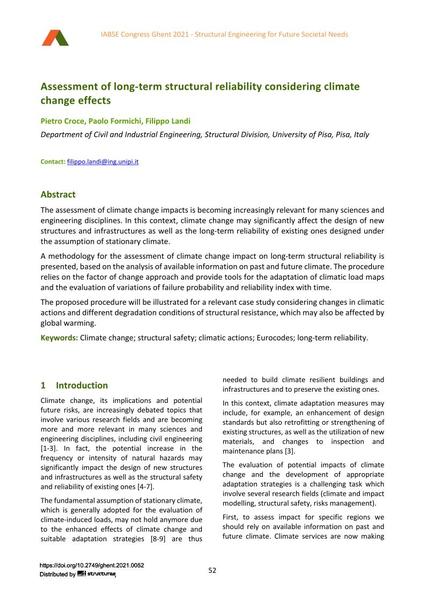Assessment of long-term structural reliability considering climate change effects

|
|
|||||||||||
Détails bibliographiques
| Auteur(s): |
Pietro Croce
Paolo Formichi (Department of Civil and Industrial Engineering, Structural Division, University of Pisa, Pisa, Italy) Filippo Landi (Department of Civil and Industrial Engineering, Structural Division, University of Pisa, Pisa, Italy) |
||||
|---|---|---|---|---|---|
| Médium: | papier de conférence | ||||
| Langue(s): | anglais | ||||
| Conférence: | IABSE Congress: Structural Engineering for Future Societal Needs, Ghent, Belgium, 22-24 September 2021 | ||||
| Publié dans: | IABSE Congress Ghent 2021 | ||||
|
|||||
| Page(s): | 52-60 | ||||
| Nombre total de pages (du PDF): | 9 | ||||
| DOI: | 10.2749/ghent.2021.0052 | ||||
| Abstrait: |
The assessment of climate change impacts is becoming increasingly relevant for many sciences and engineering disciplines. In this context, climate change may significantly affect the design of new structures and infrastructures as well as the long-term reliability of existing ones designed under the assumption of stationary climate. A methodology for the assessment of climate change impact on long-term structural reliability is presented, based on the analysis of available information on past and future climate. The procedure relies on the factor of change approach and provide tools for the adaptation of climatic load maps and the evaluation of variations of failure probability and reliability index with time. The proposed procedure will be illustrated for a relevant case study considering changes in climatic actions and different degradation conditions of structural resistance, which may also be affected by global warming. |
||||
| Copyright: | © 2021 International Association for Bridge and Structural Engineering (IABSE) | ||||
| License: | Cette oeuvre ne peut être utilisée sans la permission de l'auteur ou détenteur des droits. |
||||
